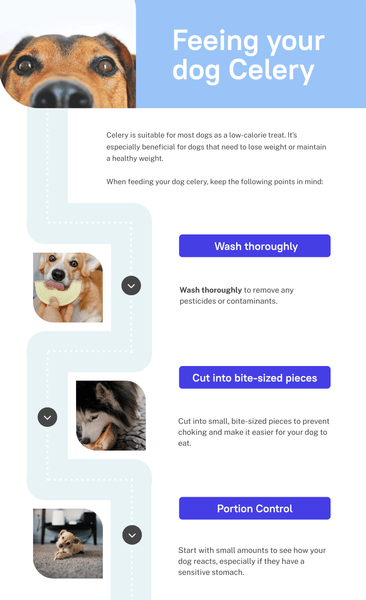Yes, dogs can eat celery. It's safe and can be a healthy, low-calorie snack for dogs. Celery contains essential vitamins and minerals beneficial for your dog's health, but it should be given in moderation as part of a balanced diet.
| Key Points |
| Celery is a safe and healthy snack for dogs to eat. It's low in calories and nutrient dense. |
| You must feed your dog celery in moderation. This chart explains how much and how often you should give your dog celery. |
| Some dogs can be allergic to celery. So, be careful when feeding for the first time. |
Is celery good for you dog?
Celery is rich in essential nutrients that can benefit a dog’s health. Meaning it is a great choice as a treat for your dog. Celery contains:
- Vitamins A, C, and K, which support vision, immune function, and blood clotting.
- Minerals like potassium, which aids in proper muscle function and overall cardiovascular health.
- Dietary fibre, which promotes healthy digestion and can aid in weight management.
Celery is especially beneficial for dogs that need to lose weight or maintain a healthy weight. However, it's essential to introduce celery to your dog's diet gradually to prevent digestive upset.
Are there any risks to feeding your dog celery?
Possible choking hazard
For smaller dogs, even bite-sized pieces can be too large, increasing the risk of choking. It’s important to chop celery into pieces small enough for your dog to safely chew and swallow.
Fibre strands
The fibrous strands in celery can also pose a choking risk, especially if not properly chewed. For some dogs, these strands may be difficult to digest if swallowed whole.
Digestive upset
Dogs have sensitive digestive systems. Rapidly introducing any new food, including celery, can lead to gastrointestinal upset. Symptoms might include diarrhoea, vomiting, or stomach discomfort.
While fiber is beneficial for digestion, too much fibre can cause issues. Overconsumption of celery can lead to an imbalance in your dog’s digestive system, resulting in diarrhoea or constipation.
How to feed your dog celery
When feeding your dog celery, keep the following three points in mind:
- Wash thoroughly to remove any pesticides or contaminants.
- Cut into small, bite-sized pieces to prevent choking and make it easier for your dog to eat.
- Start with small amounts to see how your dog reacts, especially if they have a sensitive stomach.

Can dogs be allergic to celery?
Allergies in dogs are more common than you think. Signs of an allergic reaction include itching, swelling, and digestive upset. If you notice any of these symptoms, stop feeding your dog celery immediately.
At My Pet Sensitivity we know it can be worrying to see your dog in discomfort which is why we created the dog food intolerance test that allows you to test if your dog is intolerant to 300 common food and non-food items.
Other fruits and vegetables your dog can eat
If your dog doesn't like celery or if you're looking for variety, there are other healthy snacks you can try. Including:
Frequently Asked Questions
How much celery can I give my dog?
The amount of celery you can give your dog depends on their size. Here's a basic guideline:
| Dog Size | Amount | Times per week |
| small dogs (up to 10 kg) | 1 to 2 small pieces | Twice per week |
| Medium dogs (up to 20kg) | 2 to 4 small pieces | Three times per week |
| Large dogs (Over 20kg) | 3 to 6 small pieces | Three times per week |
Can celery help with my dog's breath?
Yes, celery can help freshen your dog's breath due to its fibrous nature, which helps clean the teeth.
Is it better to give my dog cooked or raw celery?
Both raw and cooked celery are safe for dogs, but raw celery provides more crunch and can help clean your dog's teeth better. Cooked celery should be plain, without any added spices or oils.
Incorporating celery into your dog's diet can be a healthy choice when done correctly. Always monitor your dog for any signs of discomfort when introducing new foods. Consult with a veterinarian if you have concerns about your dog’s diet.

